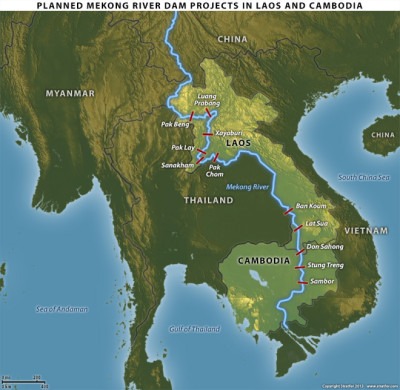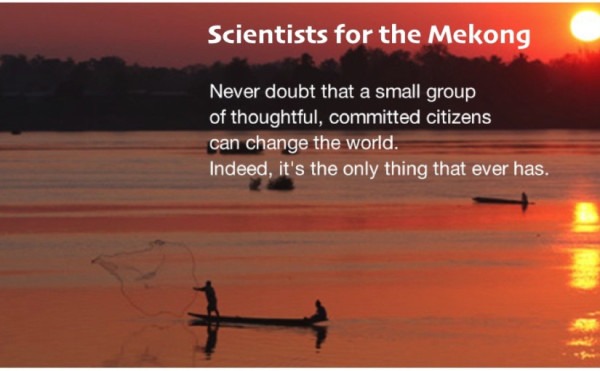Item Link: Access the Resource
Date of Publication: November 25, 2015
Year of Publication: 2015
Publisher: Scientists for the Mekong
Author(s): Dr. Lilliana Corredor
Scientists for the Mekong offer this article to infomr the public, the delegates at COP21, and decision makers worldwide about the impacts of Hydropower Development on the Lower Mekong River. Particularly, their serious repercussions: the Risk to Food Security of 60 million people in SE Asia, the massive Ecological and Economic losses, and their vast contribution of Carbon and Methane Emissions to Climate Warming.

We invite you to download the PDF file here: (edited 5 Dec. 2015)
COP21 – Mekong Dolphin Extinction, Hydropower & Climate Change
This article provides an Overview of the many significant Environmental and Social impacts of Hydropower Dams on the Mekong River basin. To mention a few:
- Blockage of vital fish migration routes
- Loss of fisheries estimated at 560,000 tons per year for Cambodia and Vietnam
- Risk to Food Security of 60 million people in SE Asia
- Loss of Biodiversity
- Blockage of vital rich nutrient soils (alluvium) for agriculture and to sustain the Mekong Delta
- Massive damage to the Mekong Delta (home to 20 million, half of whom may end in Refugee camps)
- Economic losses of over $1 billion per annum for Vietnam, including Rice, fruit & vegetable export crops
- The impacts of Hydropower Dams on Communities’ displaced by dams: psychological distress, loss of known food supply, relocation to unknown lands, loss of property, loss of livelihood, loss of cultural sites
- Substandard compensation to communities for losses
- The extinction of the Irrawaddy dolphins, the rare Giant Catfish and hundreds of other aquatic species; among others.
We address “very sensitive issues”, which local people in the region cannot afford to discuss for fear of antagonizing governments, fear of loosing their jobs, fear of ending in jail or even fear of being killed. As for foreigners most don’t openly discuss these issues because
“we have to continue living and working here”:
- The Human Rights Violations associated with Hydropower Dams
- Who are the real Beneficiaries of Dams (Banks & Corporations are named)
- The impacts of Hydropower Dams on Climate Change.
The impacts by Hydropower Dams on Climate Change are a grave concern and deserve a mention in this summary. Particularly, because Hydropower Dams are being promoted at COP21 as:
- A Clean and Green Source of Energy
- A Sustainable Development
- A Tool for Reduction of Poverty.
This could not be further from the truth. Well on the contrary, we look at 20 years of research measuring CO2 and Methane emissions by Hydropower dams and their damaging effects on Climate warming.
Hydropower is shown to be one of the biggest sources of air pollution, accounting for 23% of the worlds’ emissions of CO2 and Methane gases. (see separate blog on this issue.)
In effect, Hydropower intensifies Climate Change.
Hydropower interest groups (Big Banks, Developers, Corporations), joined by poor countries such as Laos, will be at COP21 meetings in Paris. They will be lobbying to develop a Global Carbon Market in which rich countries are allowed to offset their emissions against Clean Energy, i.e. against Hydropower’s supposedly ‘Clean energy‘…
(This means more business for Hydropower interest groups.)
If such a decision was made on behalf of Hydropower dams, it would justify a Chinese-led frenzy of Hydropower Dams construction around the world,with disastrous consequences for Climate Change and Water Resources worldwide.
A Global Carbon Market endorsement of Hydropower will also give Carte Blanche to Brazil, Peru, Ecuador, Venezuela, Colombia, Bolivia, Surinam and the Guianas to build hundreds of dams in the Amazon basin, with the ensuing massive deforestation necessary to build the Dams’ reservoirs. It would also encourage Laos to build another 70 dams, and other nations to build thousands of others.
The resulting impact on Water Ecosystems, Forests and Climate Change worldwide would be staggering and irreversible!
As it is, the planet’s rivers are already suffering enormously from over 40,000 dams already built, from water pollution and climate change.
Any more dams will tip the balance against our most precious resources: WATER & AIR!
Moreover, any dams built on a large scale will also entail the displacement of hundreds of millions of people worldwide, creating a disastrous unnecessary humanitarian crisis. To date nearly 100 million people have already been displaced for the construction of Dams, mostly in China and India.
Building new hydropower dams is totally unnecessary. This is particularly true given that there are other better and less damaging options, such as Solar and Wind technologies. Poor countries like Laos, Cambodia and Vietnam are better served developing these technologies and getting international funding and technical support to do so.
We conclude that Hydropower is not only an unethical development, both environmentally and socially, but it is also unsustainable.
A number of recommendations are offered, including that: the construction of large Dams must be discouraged and stopped worldwide.
Feel free to publish and share this article – without any changes to its content and giving credit to the author.
ACTIONS You Can Take
- Sign our Petition to STOP Hydropower dams in the Mekong
- Sign the Petition by International Rivers: 10 Reasons Why Climate Initiatives Should Not Include Large Hydro
Article published by:
Dr. Lilliana Corredor
Founder & Coordinator, Scientists for the Mekong
NSW, Australia
B.Sc. Biology & Chemistry
M.Sc. Marine Biology
Maitrisse General Oceanography
D.E.A. Biological Oceanography
Ph.D. Behavioural Sciences
Environmental Educator
Weekly updates: https://www.facebook.com/scientists.for.the.mekong
Twitter: @Amarial1

